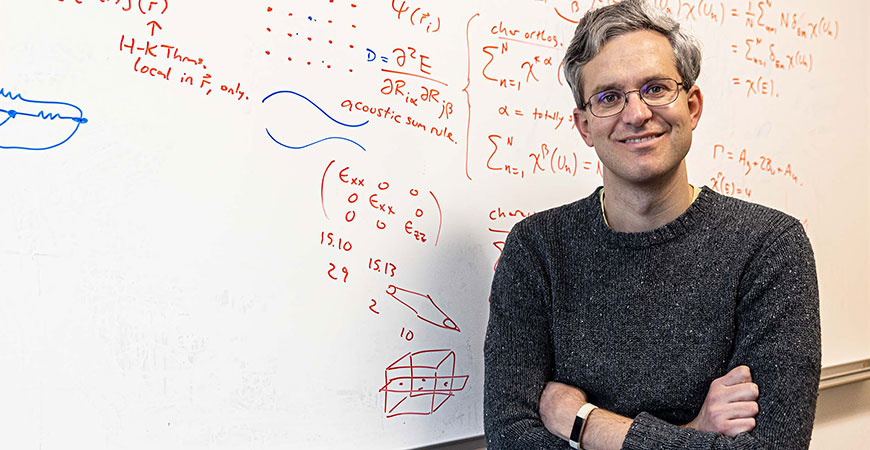
Professor David Strubbe has become the eighth faculty member of the 21-member Department of Physics to receive a National Science Foundation (NSF) CAREER award for his research into improving the fundamental understanding of the interaction of light and vibrations in materials.
He is the 29th researcher from UC Merced and the 15th from the School of Natural Sciences to receive this award.
CAREER awards are among the NSF’s most prestigious. They are given through the Faculty Early Career Development Program to recognize untenured faculty members as teacher-scholars. Early-career faculty members are selected based on three factors: the strength of their research proposals; their potential to serve as academic role models in research and education; and their leadership in their field and organizations.
Strubbe will receive a little more than $500,000 over the next five years for his project “Exciton-Phonon Coupling in Quantum Materials: Atomistic Insight for Defects and 2D Materials.” The grant is awarded through the Division of Materials Research.
Strubbe’s research areas in theoretical condensed-matter physics and materials science include amorphous materials, photovoltaics and scientific code development. Through his CAREER award, Strubbe, a computational physicist, will explore new methods for calculating the interactions between light and vibrations of atoms in 2D materials (consisting of atomically thin layers) and defects (where atoms are out of place or substituted in a material). His group will calculate spectra of possible atomic structures to figure out which ones are present in samples studied in experiments, collaborating with fellow physics professors Michael Scheibner and Hui Cai, who are experimentalists, to create and study new materials.
“The interaction between light and the atomic vibrations can directly affect how well these structures can work in applications such as quantum computing,” Strubbe explained.
Strubbe and his lab will be learning about which structures are most promising for such applications. Such understanding could make help bring quantum computing closer to practical usage. Other applications could include using light-emitting structures in these materials to enhance quantum-encrypted communications.
“Our calculations will be able to give new insight into this exciting emerging area,” Strubbe said.
Each CAREER award proposal includes an educational outreach component, and Strubbe is developing a lab module for a sophomore physics course designed to get students more excited about physics and research. Typical undergraduate labs involve trying to get an answer that is already known. But Strubbe said his module involves research in which the answers are unknown. For many of the students, this module will be their first foray into real scientific research. They will calculate the properties of different combinations of 2D materials that could be used for optical or electronic devices.
“It’s a course-based research experience for undergrads, and they will be making real contributions to scientific knowledge,” Strubbe said.
Department of Physics Chair Professor Ajay Gopinathan is proud to highlight the success of the faculty in his group and said Strubbe’s work in his early career earned him this award.
“The NSF CAREER award is one of the most prestigious honors for junior faculty and a recognition of the strength of David’s outstanding research and educational efforts,” Gopinathan said. “David’s excellence extends beyond his research and is reflected in his exceptional service, outreach and contributions to diversity. We are proud to be able to recruit and support such stellar faculty.”
Strubbe has been with UC Merced since 2016. He is a co-PI of the Merced nAnomaterials Center for Energy and Sensing (MACES) and is part of the Consortium for High Energy Density Science , the Center for Chemical Computation and Theory and the newly formed NSF training grant Convergence of Nano-engineered Devices for Environmental and Sustainability Applications (CONDESA).
“I am excited for the new directions in research and education we will go in with this CAREER award,” Strubbe said. “I appreciate the hard work of my grad students and postdocs that gave the preliminary data and record of research accomplishments that led to this award.”

